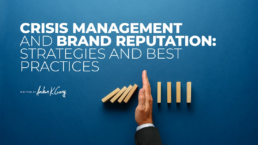Hey there, aspiring entrepreneur! You’ve likely been told countless times that brand reputation management is everything in business. That’s because it’s true! Think about it. We all have that one brand we swear by — whether it’s a tech giant like Apple, a coffee tycoon like Starbucks, or a small local bakery that makes the world’s best pastries. Their reputation is what draws us in and keeps us coming back.
But what happens when a crisis hits? It’s like a storm brewing on a sunny day, casting a shadow over your brand. It can be anything — a faulty product, a controversial ad, or a negative social media backlash. It’s not the most pleasant thing to think about, but it’s crucial to be prepared for such situations. Because, let’s face it, even the best of brands aren’t immune to crises.
So, how do you protect your brand and manage a crisis effectively? Well, that’s exactly what we’ll explore in this post. Let’s dive in and arm you with some practical strategies and best practices that you can use to navigate through any crisis, ensuring your brand remains strong and resilient.
Understanding Crisis Management
What is Crisis Management?
Crisis Management is a bit like being a firefighter. When a fire breaks out (the crisis), the firefighter (that’s you) rushes to the scene to put out the flames and minimize the damage. The aim is to resolve the situation as quickly and efficiently as possible, preventing it from spiraling out of control.
In business terms, Crisis Management involves identifying a threat to your organization and its stakeholders, and responding in a way that minimizes harm and protects your brand’s reputation. It requires quick thinking, effective decision-making, and clear communication — all while staying calm under pressure. Sound a bit daunting? Don’t worry, we’ll break it down together!
Remember, a crisis doesn’t necessarily mean the end of the world (or your brand). In fact, how you handle a crisis can actually strengthen your brand’s reputation and earn you respect from your audience. It’s all about turning adversity into opportunity.
The Importance of Crisis Management
You might be wondering, “Why should I worry about Crisis Management? My brand is doing great, and I don’t foresee any major hiccups on the horizon.” That’s a fantastic mindset to have, but as the saying goes, it’s better to be safe than sorry.
Without a proper Crisis Management plan in place, a minor issue can quickly snowball into a major disaster. On the other hand, a well-managed crisis can enhance your brand’s reputation, demonstrate your commitment to transparency, and show your customers that you genuinely care about them.
Also, let’s not forget the power of social media in today’s world. News, especially bad news, travels fast. A negative tweet or a bad review can spread like wildfire, causing significant damage to your brand’s reputation. Effective Crisis Management can help mitigate this damage and control the narrative before it gets out of hand.
Strategies and Best Practices
Developing a Crisis Management Plan
Alright, now that we understand what Crisis Management is and why it’s important, let’s discuss how you can prepare for a potential crisis. Just like you wouldn’t enter a battlefield without a plan, you shouldn’t face a crisis unprepared. A Crisis Management plan is your roadmap, guiding you through the chaos and towards a resolution.
First off, identify potential crises that could affect your business. Think about your industry, your products or services, and your operations. Once you’ve pinpointed potential threats, it’s time to develop strategies for dealing with them. This could involve improving product safety measures, creating a strong PR team, or even setting up a dedicated social media response team.
Finally, remember to review and update your plan regularly. As your business grows and evolves, so too will the potential risks. An outdated Crisis Management plan is as good as no plan at all, so make sure it’s always up-to-date and relevant to your current business situation.
Communication is Key
When a crisis hits, the last thing you want is for your customers to be left in the dark. Transparency and open communication are key in managing a crisis effectively. This means being honest about the situation, accepting responsibility when needed, and keeping your audience informed about the steps you’re taking to resolve the issue.
Whether it’s through social media, press releases, or direct emails, make sure to keep the lines of communication open. Be proactive in addressing the issue, rather than waiting for the rumor mill to churn. Remember, you want to be the one controlling the narrative, not the other way around.
Also, be sure to communicate with your employees and other stakeholders. They are your brand’s ambassadors and can play a crucial role in managing the crisis and rebuilding your brand’s reputation.
Learning from the Crisis
Once the storm has passed, it’s time to assess the damage and learn from the experience. What went wrong? How could it have been prevented? What can be improved? Use the crisis as a learning opportunity to strengthen your brand and prevent similar situations in the future.
Consider conducting a post-crisis analysis to identify the root cause of the crisis and evaluate your response. This will help you understand what worked, what didn’t, and how you can improve your Crisis Management strategies moving forward.
Finally, don’t forget to rebuild and restore your brand’s reputation. This could involve improving your products or services, enhancing your customer service, or launching a positive PR campaign. Remember, a crisis is a setback, not the end. With the right strategies and a positive mindset, you can come back stronger than ever.
Conclusion
As an aspiring entrepreneur, navigating through a crisis may seem like a daunting task. But with the right preparation and strategies, you can turn a crisis into an opportunity to showcase your brand’s resilience and commitment to your customers.
Remember, the goal of Crisis Management is not just to put out the fire, but also to rebuild from the ashes and come back stronger. So, equip yourself with these strategies and best practices, and you’ll be well-prepared to protect and enhance your brand’s reputation, no matter what storms may come your way.
Keep dreaming, keep building, and keep making a difference with your brand.




